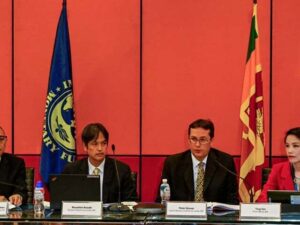
The IMF has approved Sri Lanka’s request for a $2.9 billion bailout, according to the country’s president, who also stated that the program will allow Sri Lanka to access up to $7 billion in total cash.
The IMF’s board stated that it had approved the loan, paving the path for its release and launching a four-year program to support the nation’s economy.
The IMF stated that the decision would provide an immediate transfer of around $333 million and would encourage additional financial support from partners, perhaps assisting Sri Lanka in overcoming its worst financial crisis in decades.
IMF Managing Director Kristalina Georgieva, however, issued a warning, urging Colombo to keep working toward tax reform, expanding social safety nets for the poor, and fighting corruption, which has been partially attributed to the crisis.
Ranil Wickremesinghe, the president of Sri Lanka, said in a statement on Monday, “I extend my gratitude to the IMF and our foreign partners for their support as we aim to get the economy back on track for the long term through careful budgetary management and our ambitious reform agenda.
Due to a severe lack of foreign currency reserves, the nation went into default on its foreign debt in April 2022 as it experienced its worst economic crisis since independence.
The 22 million-person nation on the Indian Ocean ran out of money to pay for even the most basic imports, resulting in severe societal unrest.
President Gotabaya Rajapaksa was compelled to leave the nation and resign in July as a result of large-scale demonstrations over his mismanagement of the economy, severe shortages of food, fuel, and medications, and skyrocketing prices.
President Wickremesinghe, who took over for Rajapaksa, has enacted severe spending cuts and tax increases in an effort to win IMF support.
The rescue had received preliminary approval from IMF staff in September, but the final go-ahead wasn’t given until China, the island’s largest bilateral lender, agreed to restructure its loans to Colombo.
A two-year moratorium on loans to Sri Lanka was announced by China this year, however the concession fell short of IMF estimates for the sustainability of the island’s debt.
Wickremesinghe had stated that he anticipated the first tranche of the IMF package will be made available within the month after China agreed to restructure its loans.
Wickremesinghe’s office announced earlier on Monday that he was looking for a 10-year moratorium on Sri Lanka’s foreign debt since it lacked the foreign reserves to pay back its loans.
Before June, when the IMF is anticipated to review the bailout package, all parties must finalize and accept the parameters of the debt restructuring, according to officials involved in the negotiations.
The IMF program will strengthen the country’s reputation in global capital markets, making it more appealing to investors and tourists, according to a statement from Wickremesinghe’s office.
Earlier, Wickremesinghe told the nation’s parliament that although there were encouraging indicators for the economy, there was still not enough foreign currency to cover all imports, making the IMF agreement essential so that other creditors could begin disbursing money.
In addition, Colombo is counting on the IMF agreement to unfreeze billions of dollars in foreign aid for projects that have been put on hold since Sri Lanka’s financial default last year.
In an effort to comply with the requirements of the IMF bailout, the administration has already hiked taxes by double, tripled energy prices, and reduced subsidies.
The health and logistics sectors were shut down last week due to strikes brought on by the austerity measures. According to Wickremesinghe, he was forced to choose an IMF program.
Georgieva argued that Sri Lanka must uphold its contentious tax measures, control spending, and stop energy subsidies.
In a statement, she added that “the momentum of ongoing progressive tax reforms should be maintained, and social safety nets should be strengthened and better targeted to the poor”.
She asked Colombo to address the widespread corruption as well.
The ongoing IMF governance diagnostic mission, which evaluates Sri Lanka’s anti-corruption and governance framework, could serve as the basis for a more thorough anti-corruption reform program, the official added.
The biggest foreign exchange shortfall Sri Lanka has seen since gaining independence from Britain in 1948 caused the country’s economy to contract by a record 7.8 percent in 2013.




